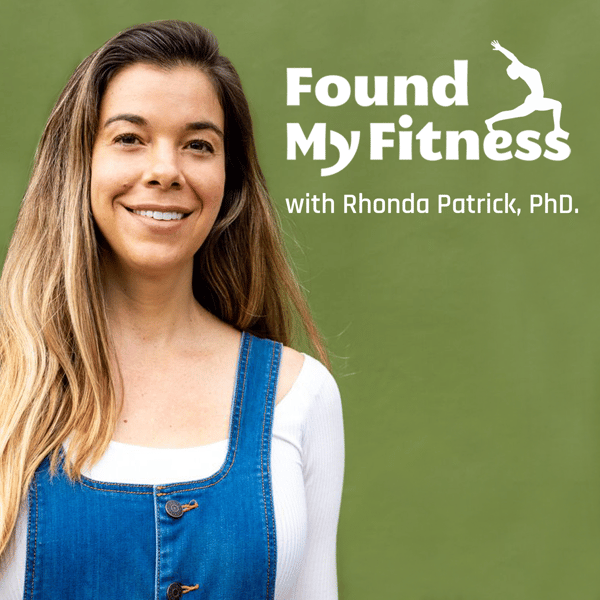#077 Rewriting genomes to eradicate disease and aging | Dr. George Church
FoundMyFitness
Rhonda Patrick, Ph.D.
4.8 • 5.5K Ratings
🗓️ 24 August 2022
⏱️ 128 minutes
🧾️ Download transcript
Summary
George Church, Ph.D. is a professor of genetics at Harvard Medical School and of health sciences and technology at both Harvard and the Massachusetts Institute of Technology. Dr. Church played an instrumental role in the Human Genome Project and is widely recognized as one of the premier scientists in the fields of gene editing technology and synthetic biology.
In this episode, we discuss:
- 07:13 - History of the Human Genome Project
- 15:20 - Manufacturing cell phones (with biology)
- 17:34 - Genome Project-Write
- 20:03 - Writing a human Y chromosome (from scratch)
- 20:48 - What if you could eliminate viral disease?
- 22:51 - De-extinction and reinstating lost traits and genes
- 27:06 - The Vertebrate Genomes Project
- 29:47 - AlphaFold and other AI tools
- 41:27 - CRISPR vs. Base Editing (emerging tools of genetic engineering)
- 49:40 - Why multiplex editing will change the world
- 52:18 - Molecular flight recorder
- 53:31 - Preventing viral spillover and enhancing livestock
- 57:40 - PCSK9 gene therapy for cholesterol
- 01:00:30 - Is aging an evolved program?
- 01:05:21 - Treating aging with a combination gene treatment
- 01:09:04 - Does animal research help us understand human aging?
- 01:11:40 - Human organoids as a model and therapeutic
- 01:13:34 - Could engineered transplant organs become better than the originals?
- 01:16:17 - Embryo editing controversy
- 01:28:41 - Gene editing for space travel
- 01:30:40 - Can synthetic biology alleviate poverty?
- 01:34:07 - Is in vitro fertilization and embryo selection practically similar to editing?
- 01:39:12 - The occasional cost of brilliance
- 01:45:45 - Eradicating disease with Gene Drive
- 01:48:55 - Technologies to solve Lyme disease
- 01:51:57 - Dr. Church's experience with narcolepsy as a bridge to creative insights
- 02:00:42 - Why George encoded his book in DNA
Show notes are available by clicking here
Join over 300,000 people and get the latest distilled information straight to your inbox weekly: https://www.foundmyfitness.com/newsletter
Become a FoundMyFitness premium member to get access to exclusive episodes, emails, live Q+A’s with Rhonda and more: https://www.foundmyfitness.com/premium
Learn more about the premium podcast The Aliquot:
https://www.foundmyfitness.com/aliquot
Transcript
Click on a timestamp to play from that location
| 0:00.0 | Today's episode is an incredible treat for those of you among us that are true, |
| 0:04.8 | bona fide believers in the ability of technical innovations to potentially change the world |
| 0:09.7 | and even foundations of biology and life itself. My guest today is Dr. George Church. |
| 0:16.3 | Dr. Church is a professor at Harvard Medical School and MIT, and arguably one of the most |
| 0:21.0 | important and accomplished geneticists of our time, with crucial contributions ranging from massive |
| 0:26.8 | advances in genome sequencing to gene editing technology, to synthetic biology, and generally the |
| 0:33.0 | increasing sophisticated application of engineering principles to biology. His lab was one of the first |
| 0:39.5 | that showed CRISPR-Cas9 worked for precise gene editing in normal human cells, and he has |
| 0:45.1 | been behind countless other scientific innovations and disruptions. Dr. Church has described the key |
| 0:50.8 | theme of his lab as the development of radical transformative technologies. Time and time again, |
| 0:56.8 | Dr. Church has found himself in what he terms, the exponential, participating in and observing |
| 1:02.9 | advances so rapid that they defied the potential of our own collective imaginings. As new technologies |
| 1:09.6 | present themselves, like gene drive, which allows gene engineering that can bend the laws of |
| 1:14.8 | Mendelian inheritance, in other words, how genes are inherited, or multiplex editing, which could |
| 1:20.5 | culminate in impressive feats like writing entire genomes from scratch, recoding organisms or |
| 1:27.0 | cells to make them immune to all viruses, or producing universal donor cells for therapeutics, |
| 1:33.2 | which could possess superhuman qualities like resistance to DNA damage, radiation, or cryopreservation. |
| 1:39.9 | All of these things challenge our ability to intuitively grasp the difference between the |
| 1:44.1 | world up to day versus the world in possibly just a few short years. For that reason, in particular, |
| 1:51.4 | I value conversations like these tremendously. As we discuss controversial topics like embryo |
| 1:57.2 | and germline editing, or the ability to promote changes that could alter the genome of an entire |
| 2:02.4 | species, a technique called gene drive technologies. The greatest danger we have as a public |
... |
Please login to see the full transcript.
Disclaimer: The podcast and artwork embedded on this page are from Rhonda Patrick, Ph.D., and are the property of its owner and not affiliated with or endorsed by Tapesearch.
Generated transcripts are the property of Rhonda Patrick, Ph.D. and are distributed freely under the Fair Use doctrine. Transcripts generated by Tapesearch are not guaranteed to be accurate.
Copyright © Tapesearch 2025.

